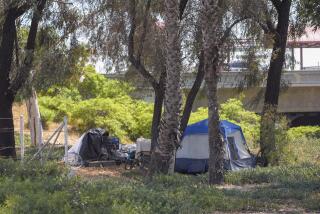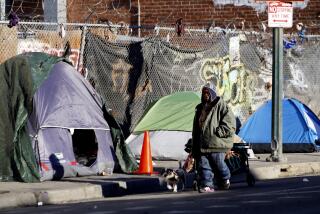A life comes out of storage
The week before Christmas, after 6 1/2 years of homelessness, I moved into a city-owned senior housing apartment in Rancho Mirage, near Palm Springs. I had been on the waiting list there for several years.
For the first few days, I marveled at my good fortune. I had a bed again. A kitchen. A bathroom. They were luxuries I’d grown used to doing without.
It was surprisingly easy to become homeless. A recession hit, and my freelance writing and public relations work dried up. By June 2002, I could no longer afford my rent, and so I had to give up my apartment.
At the time, I thought that living in my Toyota pickup truck would be temporary. But finding an affordable place to live proved overwhelmingly difficult, as I wrote in an Op-Ed article for this newspaper on Thanksgiving Day. With most of my belongings in storage, I camped at public campgrounds and once in awhile at a Wal-Mart parking lot, staying in the deserts of Southern California in the winter and spending summers in Montana, where I had once lived.
I had just about given up on finding a place. Then, in early December, I got a phone call saying my name had finally hit the top of Rancho Mirage’s housing list for low-income seniors.
The apartment was small but nice, in a complex with orange and palm trees. I knew that I wanted it, but my problems weren’t quite over. I didn’t have enough cash to pay a security deposit and the first month’s rent, which is calculated at 30% of income. The apartment manager suggested contacting some charities.
Two of the groups couldn’t help. But Desert Samaritans for the Elderly, a local group that provides aid to seniors in crisis, offered to assist me with the initial rent. The director of Jewish Family Services in Palm Springs, who had read my story in The Times, said he would find funds to help with half my security deposit.
When I said goodbye to the host at a campground where I’d frequently stayed over the years, he was pleased for me. “You’ve suffered enough. Enjoy,” he said.
I moved into the apartment during a heavy rainstorm, glad to not be at the muddy campground, and over the next few days began adjusting to my new life. I bought groceries, cleaning supplies, a shower curtain and bath rug, all items I’d had no need for while camping. I retrieved from storage my microwave, TV, bed, computer, stereo and clothes I hadn’t thought about for years, including suits and ties I’d had no need for while homeless.
My things were wrapped in newspapers from the spring of 2002. There were stories about the Chandra Levy murder case in Washington, and about Shaquille O’Neal and Kobe Bryant playing together in the playoffs for the Los Angeles Lakers. I could hardly believe 6 1/2 years had passed. It was a little like an archaeological dig. Here were the pictures of my estranged adult daughters in happier times. Here were the CDs I’d forgotten I had.
My desktop and laptop computers were out of date and mostly unusable. But my sheets, blankets and dishes just needed to be cleaned, and that was easily accomplished now that I had a dishwasher and a washing machine.
Every day now seems to me like a gift. One of my delights was finding my toaster and having an English muffin with jam, a morning routine that belonged to my former life. I am eating healthier meals now that I don’t have to rely on fast-food outlets. I use the heated pool and hot tub to sooth my aching muscles.
Having recently gotten Medicare and Medicaid, I had cataract surgery a week after moving into my new place and got long-needed hearing aids. I had expected to recuperate from the eye surgery in my truck after splurging on one night in a motel.
There were times when I was homeless that I felt like Job in the Bible. Sometimes I got angry at God, but prayer and meditation helped me to cope and to accept my situation. Now that my life has turned around, I offer prayers of thanks.
I also pray for people I know who are still homeless. In the Coachella Valley alone, there are thousands of seniors and low-income families on waiting lists for subsidized housing in the various desert cities. And with so many people being hit hard in this latest recession, there are likely to be more people driven into homelessness, as I was.
Because the rent is so low, senior housing rarely has vacancies until a tenant dies or has to go to a nursing home. There is a shortage of low-income housing for families too. To make matters worse, the state has stopped taking applications for subsidized housing because of the budget crisis.
After my Thanksgiving article, a formerly homeless vet wrote to me that if I wanted to change my situation, I had to do it myself, as almost no one would assist me. Unfortunately, for many homeless people, that’s true. I’m grateful I had help.
More to Read
Sign up for Essential California
The most important California stories and recommendations in your inbox every morning.
You may occasionally receive promotional content from the Los Angeles Times.










